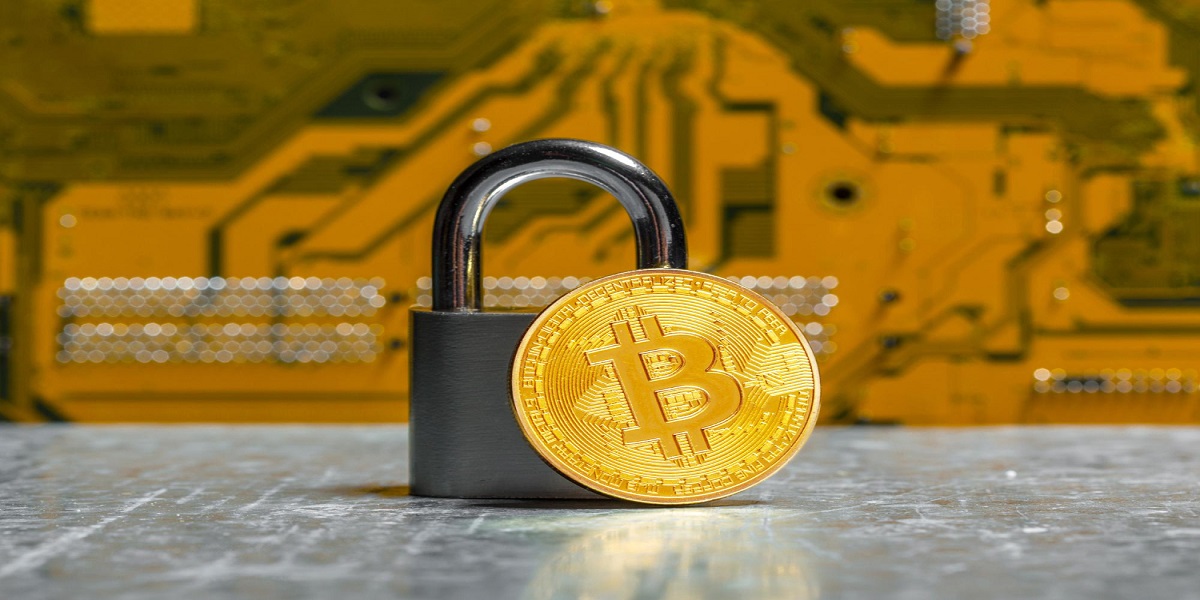Crypto Security: Best Practices for Protecting Your Investments
- By Lilly Partin
- 04-07-2023
- Cryptocurrency

Cryptocurrencies have become a very popular investment option in recent years. However, this increase in interest has increased the demand for crypto security. Cryptocurrencies are susceptible to theft, hacking, and other illegal actions since they are digital assets. We shall examine the ideal procedures for safeguarding your cryptocurrency assets in this post. By putting these security measures in place, investors of all expertise levels can protect their digital assets.
Table of Contents:
- Avoiding Phishing and Scams
- Secure Internet Practices
- Diversification and Backup Strategies
- Staying Informed and Educated
- Understanding the Threat Landscape
- Strong Passwords and Two-Factor Authentication
- Secure Storage Solutions: Wallets
- Cold Storage: Hardware Wallets:
- Software Wallets: Desktop and Mobile Applications
- Keeping Software Up to Date:
- Conclusion
Avoiding Phishing and Scams:
Attacks that pose a phishing risk are still common in the crypto industry. Be wary of dubious emails, texts, or websites that try to con you into disclosing your login information or private keys. Always verify the URLs to be sure the websites you are visiting are trustworthy. Avoid downloading files from unreliable sources or clicking on unfamiliar links. Use bookmarks or manually enter the website address when engaging with bitcoin platforms or exchanges rather than depending on search engine results. Be aware of offers that look too good to be true and be suspicious of unsolicited investment possibilities. To guard against phishing attempts and frauds, use your intuition and use caution.
Secure Internet Practices:
Maintaining safe online habits is equally necessary for protecting your cryptocurrency assets. Avoid connecting to insecure public Wi-Fi networks since they might expose your critical information to eavesdroppers. Instead, to encrypt your internet connection and improve your privacy, utilize a personal, secure internet connection or a virtual private network (VPN) to access your cryptocurrency accounts. Keep your antivirus software and operating system updated and regularly scan your devices for infection. To reduce the danger of malware infection, think about adopting specialized hardware or distinct virtual machines for your bitcoin activity.
Diversification and Backup Strategies:
The fundamental rule of investing is diversification, and this rule also holds true for cryptocurrencies. Consider spreading your assets over a number of wallets or storage options rather than storing all of your money in one wallet or exchange. As a result, the danger of a single point of failure is diminished. Furthermore, make backups of your wallets and keep them safely offline in places like a safe or hardware device. Your backup data must be encrypted and secured with strong passwords. Test your backups often to make sure they can be properly restored in an emergency. By implementing a strong backup system, you may retrieve your assets even if you lose access to one wallet or experience technical difficulties.
Staying Informed and Educated:
Crypto security procedures change as a result of emerging dangers and technological improvements. It's crucial to keep up with the most recent security developments and procedures. Follow reliable sources of cryptocurrency news, take part in forums and online groups, and network with other experts in the sector. You may proactively adjust your security procedures to reduce new hazards by remaining aware. Consider reading books and articles, attending webinars or workshops, reading webinars or workshops, taking blockchain and cryptocurrency security certification exams, or perhaps all of the above. You can make wise selections and efficiently preserve your money if you keep learning and keeping up with current events.
Understanding the Threat Landscape:
Understanding the various hazards to your cryptocurrency assets is essential before diving into the best practices. Due to the high value of digital assets, cryptocurrency exchanges and wallets are frequently the target of hackers. Vulnerabilities are frequently exploited via social engineering tactics, malware, and phishing assaults. Being aware of these threats will enable you to exercise caution and take the appropriate security precautions.
Strong Passwords and Two-Factor Authentication:
For all of your accounts linked to cryptocurrencies, you must create secure, one-of-a-kind passwords. Make use of both capital and lowercase letters, digits, and special characters. Do not use information that may be easily guessed, such as names, dates, or everyday terms. Additionally, wherever feasible, activate two-factor authentication (2FA). By requiring a second verification step, such a code produced by a mobile app or received by SMS, 2FA offers an extra degree of protection.
Secure Storage Solutions: Wallets:
Your digital assets are stored and managed using a crypto wallet. Hardware wallets and software wallets are the two primary categories of wallets that are often utilized.
a. Cold Storage: Hardware Wallets:
Since your private keys are stored in a network-free, offline environment in hardware wallets, they are frequently referred to as "cold storage." This crucial advantage significantly reduces the risk of internet attacks since hackers cannot remotely access your private keys. Strong security mechanisms are specifically included into hardware wallets to protect your digital assets. Encryption is one of the primary security aspects of hardware wallets. Your private keys are encrypted and kept in the device's secure element when you set up a hardware wallet. This encryption makes sure that the private keys are safe and unavailable to unauthorized people even if the device is compromised or stolen.
Hardware wallets also use PIN numbers as an additional security measure.
The PIN code protects the gadget from being used without authorization. It is crucial to select a PIN code that is difficult to guess. Useless PINs like birthdates or consecutive digits should be avoided. In order to further defend against brute-force assaults, the hardware wallet will often set a limit on the number of erroneous tries before locking itself.
Hardware wallets also support a variety of coins.
Because of its adaptability, you may safely store a variety of digital content on a single device. The software that comes with the wallet has an intuitive user interface that makes it simple for you to access and manage your cryptocurrency.
It is essential to buy your hardware wallet directly from the maker or from authorized resellers in order to guarantee its integrity and security.
Purchasing from reliable providers reduces the possibility of obtaining manipulated goods or imitations. You may assist verify that you receive a genuine and unharmed device by examining the hardware wallet's legitimacy, the wallet's packing, and any indications of manipulation.
To ensure the security and integrity of your hardware wallet, always purchase it from the manufacturer or from licensed resellers.
Buying from reputable suppliers lessens the chance of receiving modified goods or knockoffs. Examining the authenticity of the hardware wallet, the wallet's packaging, and any signs of manipulation will help you confirm that you receive a real and undamaged device.
b. Software Wallets: Desktop and Mobile Applications:
You can easily access your digital assets from a variety of devices thanks to their simple accessibility. Software wallets, as opposed to hardware wallets, are intrinsically more vulnerable to internet dangers, thus it's crucial to be aware of this.
Selecting a software wallet from a reliable vendor is essential.
Rely only on reputable wallet providers with a solid history of security. Downloading wallets from unreliable websites or sources is not recommended because they can include dangerous code or be modified versions that jeopardize the security of your money. Always download the wallet app straight from reputable app stores or authorized websites.
Regular backups are necessary regardless of the wallet type you use.
By backing up your software wallet, you may be confident that your money will be available in the event that your device is lost, broken, or subject to other unanticipated events. Make careful to save your wallet backup safely, preferably in many places and encrypted if you can. To protect your backup from potential internet risks, think about adopting offline storage solutions like external hard drives or encrypted USB devices.
Choose software wallets with cutting-edge features like encryption and multi-signature support for increased security.
By encrypting your private keys and wallet data, encryption adds an extra degree of security, making it more challenging for attackers to access your money. On the other side, multi-signature functionality necessitates several authorized signatures to begin transactions, adding an extra layer of protection against illegal access.
Remember that mobile wallets installed on jailbroken or rooted devices might jeopardize the security of your cryptocurrency assets.
By removing the operating system's built-in security safeguards through rooting or jailbreaking, the device becomes more susceptible to malware and illegal access. It is thus advised to use safe, non-modified handsets over rooted or jailbroken ones while utilizing mobile wallets.
You can significantly lower the risks related to software wallets by taking these precautions when using them, such as picking reputable providers, downloading from legitimate sources, securely backing up your wallet, utilizing cutting-edge security features, and avoiding rooted or jailbroken devices. To take advantage of the most recent security updates and upgrades offered by the wallet provider, update your software wallet often.
Although software wallets are convenient, it's important to prioritize security and take precautions to adequately preserve your cryptocurrency assets. You may build a strong security framework to protect your digital assets by combining the best practices of software wallets with additional security measures like strong passwords, two-factor authentication, and secure internet usage.
Keeping Software Up to Date:
For continued robust security, upgrading your software on a regular basis is essential. Updates from wallet providers are routinely published, and they fix issues, strengthen security, and enhance usability. To keep safe against new threats, turn on automatic updates whenever feasible and often check for new releases of the program.
Conclusion:
A proactive approach to security is necessary to safeguard your cryptocurrency assets. You can significantly lower the risk of theft and unauthorized access to your digital assets by putting into practice the best practices discussed in this article, such as using strong passwords, enabling two-factor authentication, selecting secure storage solutions, being watchful of phishing attempts, and adopting secure internet habits. Don't forget to diversify your assets, use backup plans, and keep up with the most recent security procedures. You may reliably preserve your digital assets and take pleasure in the advantages of investing in cryptocurrencies with peace of mind by placing a high priority on security.


.jpg)
.jpg)
.jpg)
